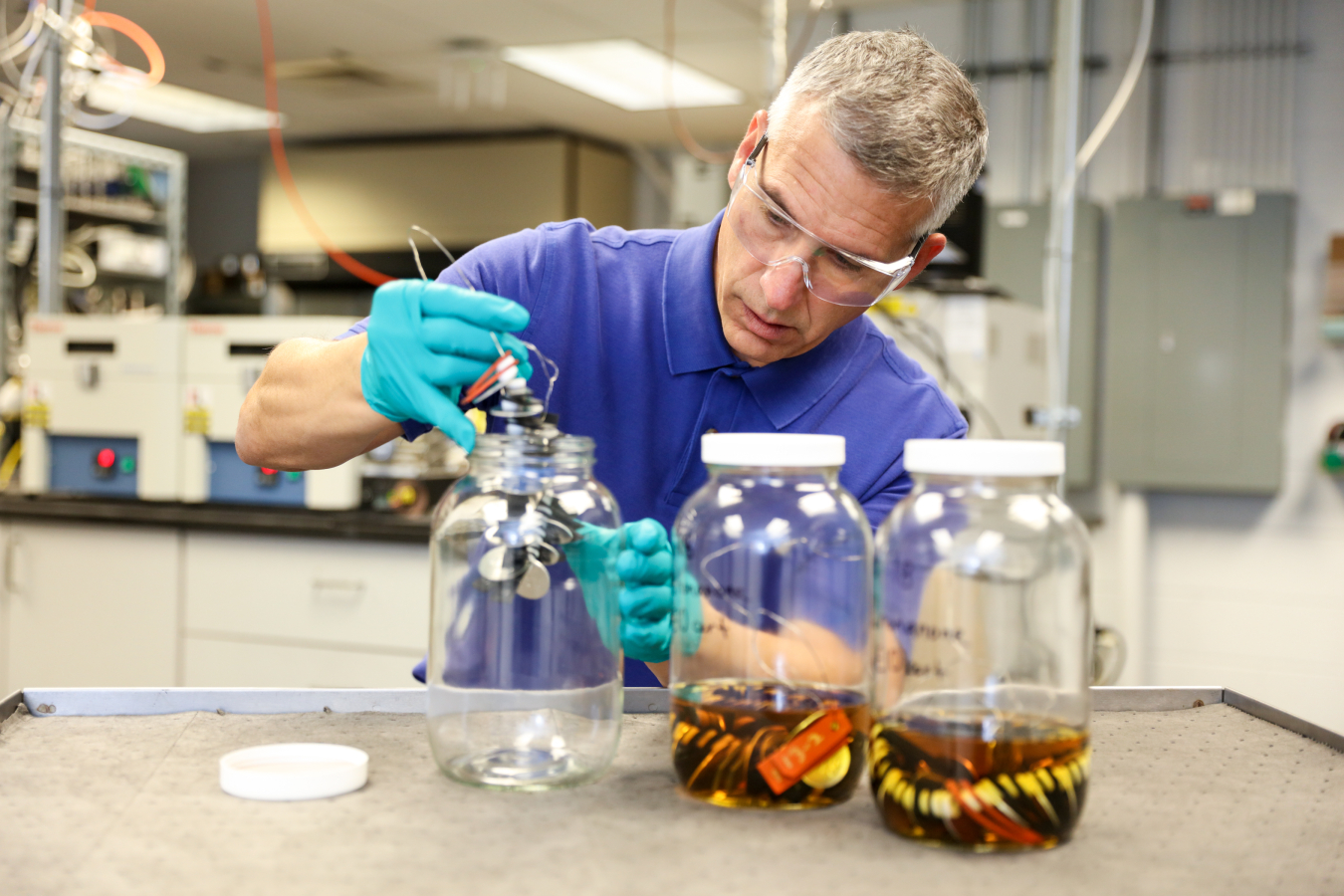
Laboratory Relationship Manager, Oak Ridge National Laboratory
Read Tim's bio ►
Meet the other bloggers ►
Return to Bioprose blog ►
A multi-laboratory team of scientists led by Oak Ridge National Laboratory (ORNL) is studying the feasibility of using energy-dense biofuels such as biocrude and bio-oil to meet new emissions regulations for cargo ships.
Cargo vessels ferrying commodities around the world are powered by two-stroke engines that are four stories tall and run on the cheapest cut from the bottom of the petroleum barrel, a heavy fuel oil (or HFO) that is laden with ash and so viscous it must be heated onboard before use. New regulations proposed by the International Maritime Organization require these ships to meet increasingly stringent reductions in carbon dioxide, particulates, and sulfur emissions over the next three decades.
Biocrude and bio-oil offer a potential solution. Naturally lower in sulfur, these fuels burn cleaner with less particulates than HFO. As a renewable fuel, they also generate a smaller carbon footprint over their lifecycle than traditional fuels. Since biocrude and bio-oil need far less processing than biodiesel and other more refined fuels, they are also lower in cost.
The opportunity is significant. More than 80% of the world’s shipped goods travel by cargo vessels. Maritime shipping globally consumes around 330 million metric tons of fuel each year – on par with the total used in U.S. planes and heavy-duty trucks. These sectors are difficult to power with electricity and batteries due to many factors, including the long distances traveled and weighty cargo loads.
There is keen interest in the shipping community to learn more about the emissions reduction potential, compatibility, sustainability, and economics of using biofuels.

“Because of the importance of world trade and the long shipping routes involved, future fuels will most likely be cleaner-burning liquid fuels,” said Tom Thompson, environmental and energy technical adviser with the U.S. Maritime Administration. “Environmental responsibility demands that biofuels receive careful attention and research for every possible adoption.”
In response, the U.S. Department of Energy Bioenergy Technologies Office (BETO) and researchers from ORNL, Argonne National Laboratory, National Renewable Energy Laboratory (NREL) and Pacific Northwest National Laboratory (PNNL) have teamed up to provide scientific data and analysis to inform stakeholder decision making.
Navigating new waters for the shipping industry
The research team collaborated with Thompson when they first examined this idea in 2018, publishing a technical report about the opportunities and challenges of using biofuels in the marine sector. This set the course for a 2020 workshop that engaged industry leaders such as Maersk and Exxon Mobil to gauge interest and hone the scientific questions to be answered.
Preliminary results from an ORNL study of blended bio-oil and HFO were promising. Scientists evaluated various mixes of HFO and bio-oil up to 50% by mass and found that good blend stability, reduced viscosity for HFO, and acceptable compatibility for low blend levels suggest that bio-oils could be suitable for use as marine fuel.

ORNL is now collaborating with experts across the national laboratory system to tackle additional technical questions about biofuel-HFO blends and to analyze the long-term sustainability and economics of using these fuels in the shipping industry.
Taking an all-hands-on-deck approach
PNNL is contributing expertise with biocrude to the effort, producing a series of samples for use in the technical feasibility studies under way at ORNL. NREL is doing the same for bio-oil and contributing technoeconomic analysis of multiple fuels. Argonne is examining the overall environmental and sustainability aspects to achieve a truly low carbon fuel. ORNL is developing a computational model of an engine in order to screen various novel fuels prior to their engine evaluation.
Integrating these capabilities and expertise across national laboratories is the quickest way to supply the data needed to inform the maritime industry, which is under some time pressure to choose a series of suitable paths to meet the new regulatory standards.
The timeline might seem long, but it is fairly tight when you factor in the massive size and diversity of the industry as well as the time needed to manufacture and adopt new technologies or fuels. These ships can’t turn on a dime, but research supported by BETO can help inform a new course toward decarbonization and less hazardous emissions.

